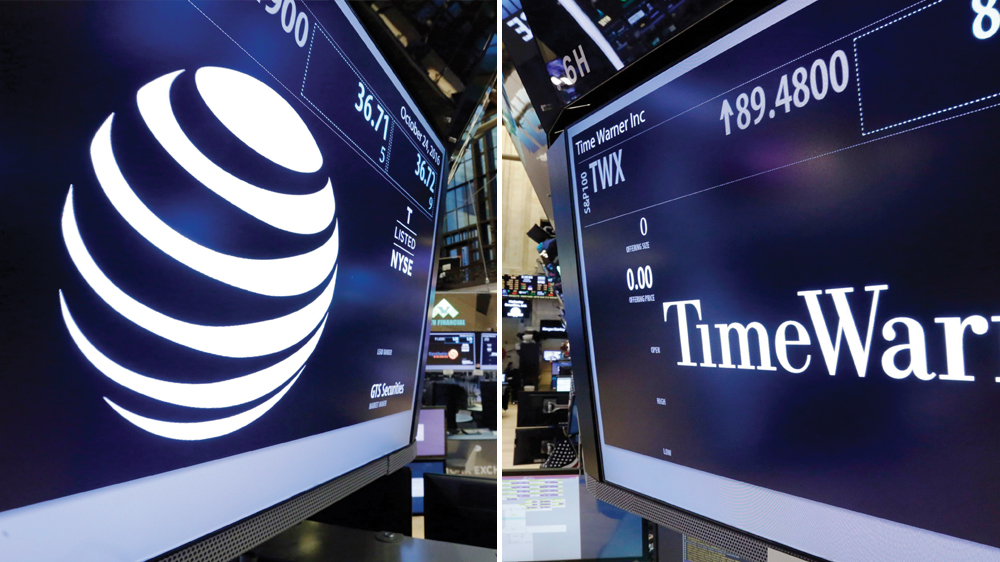DOJ, AT&T-Time Warner Provide Conflicting Accounts of Pre-Antitrust Suit Clash
By Ted Johnson
LOS ANGELES (Variety.com) – WASHINGTON — As the Justice Department pursues its appeal of a federal judge’s decision in favor of the AT&T-Time Warner merger, new court filings shed light on the tense meetings that ended with the filing of the landmark lawsuit.
The contentiousness in one key meeting revolved around the companies’ claims that they were being unfairly singled out for an enforcement action, because of President Donald Trump’s opposition to the deal and hatred of Time Warner-division .
According to affidavits filed in federal appellate court on Thursday, a Nov. 8 meeting between the DOJ and Time Warner executives was particularly acrimonious, ending in what top government attorneys said was a verbal threat.
At one point, according to an affidavit from Makan Delrahim, the chief of the Antitrust Division, Time Warner general counsel Paul Cappuccio got up from his seat at a conference table “and said that if the Antitrust Division goes through with this, the case will be ‘a s—show like you’ve never seen,’ and that it would be like ‘Jimmy Hoffa and the firing of Jim Comey.’”
“I interpreted Mr. Cappuccio’s comments to mean that if we brought this enforcement action, defendants would employ personal attacks to denigrate the integrity of the Antitrust Division and myself,” Delrahim said in his declaration.
Andrew Finch, the deputy assistant attorney general for the Antitrust Division, also filed a sworn declaration describing the same details of the meeting.
Another person who was in the room was former attorney general William Barr, a member of the Time Warner board of directors. Barr happened to be in the building that day for the announcement of a new fellowship program, and Delrahim said he asked to attend the meeting. Delrahim agreed.
In his affidavit, Barr provides a different account of what was said, characterizing Delrahim and Finch’s version of events as “incorrect.”
“Mr. Cappuccio did not stand up and wag his finger at Mr. Delrahim and I do not recall any references to either James Comey or Jimmy Hoffa. No reasonable person could have attributed Mr. Cappuccio’s comments as a threat that the companies would personally attack Mr. Delrahim or anyone else in the event of litigation,” Barr said.
He also said the discomfort he felt at the meeting was not over what Cappuccio said, but “was the result of my concern that Mr. Delrahim’s position that the alleged harms from this merger and his inexplicable ipse dixit rejection of remedies short of extreme divestitures were the product not of a well-versed substantive analysis, but rather political or other motivation. As a former Attorney General, that is disturbing to me.”
The DOJ filed suit against the merger on Nov. 20.
The sworn declarations were made in February, just before sought to pursue discovery on their claims that they were unfairly singled out for antitrust enforcement. But U.S. District Judge Richard Leon rejected that motion and kept the trial focused on antitrust law.
Delrahim has denied that CNN and its coverage of the administration was a factor in the decision to file suit, and he also said he did not receive any orders to do so from Trump or the White House.
“My decision was based on the merits and my belief that the transaction would likely substantially lessen competition and harm American consumers in violation of Section 7 of the Clayton Act,” he said in his declaration.
An AT&T spokeswoman said in a statement, “Our opinion of the government’s lawsuit is no secret, and we appreciate former Attorney General Barr stepping forward to provide his first-hand account of DOJ’s interactions with us in the days prior to filing suit.”
Barr was attorney general from 1991 to 1993 under the presidency of George H.W. Bush.
Leon’s opinion, issued on June 12, rejected all of the government’s arguments against the merger. The two companies completed their transaction two days later.
In their filing, the Justice Department said Leon “rejected the economics of bargaining” in his opinion, and that AT&T has failed to address those “inconsistencies” as it argues that the decision should be upheld.
The DOJ argues that the combined company would gain increased leverage over pay-TV rivals, as it could threaten to black out channels like CNN, TNT, and TBS. Customers would then drop their service and perhaps sign on to AT&T-owned DirecTV, the government claims.
In their filing, the DOJ said AT&T “cannot explain how Time Warner had leverage from threatening blackouts before the merger, but could not have any credible ability to threaten blackouts after the merger.”

